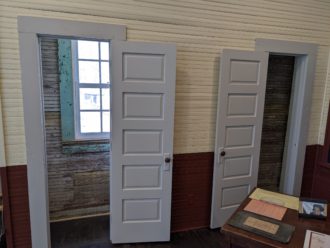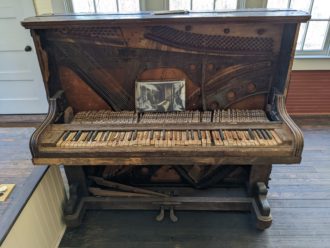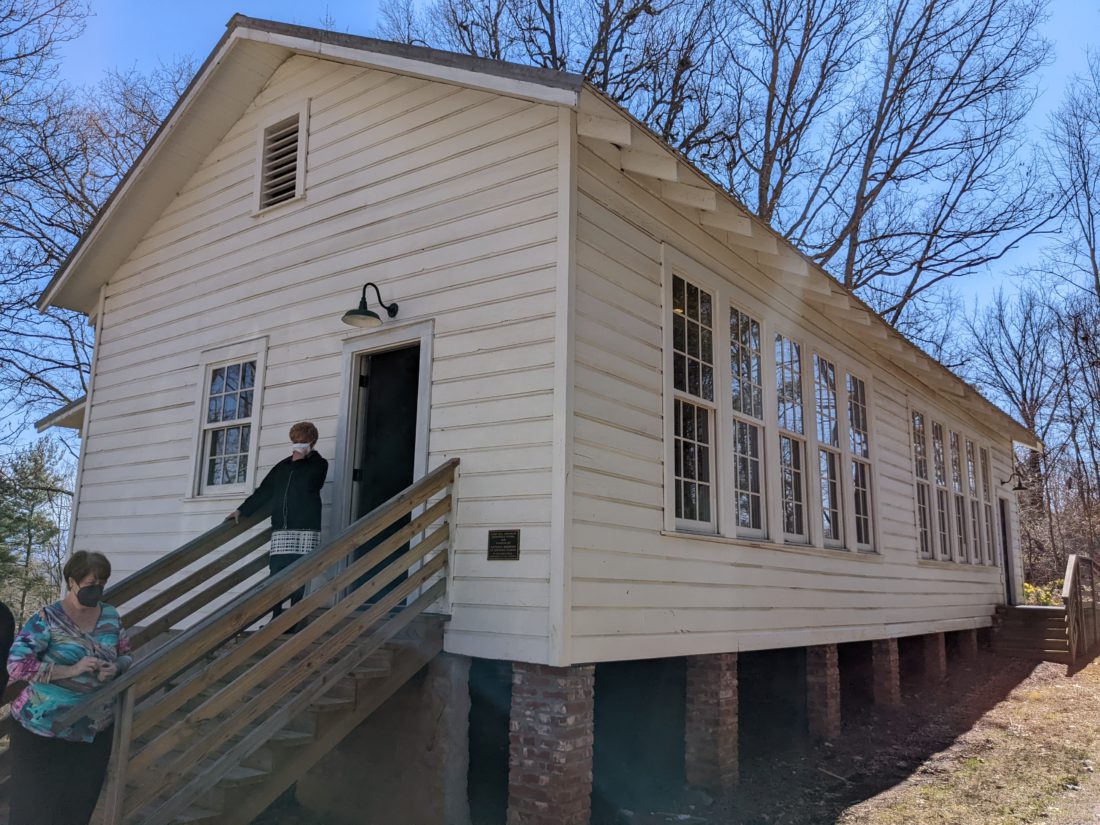What was once a beacon of hope and progress for Madison County’s Black community, only to fall into disrepair, is again a point of pride — and should continue to be for decades to come.
Thirteen years after the Mars Hill Anderson Rosenwald School’s fate was in jeopardy, individuals committed to its preservation have completed an extensive round of repairs and are poised to reinvent the space as an interpretive museum and cultural community arts center. But first: a yearlong celebration with newfound, like-minded partners dedicated to sustaining the history of preintegration Black education — and encouraging future generations to learn from the past and help support a more equitable future for everyone.
Path to preservation
Originally called the Mars Hill School, the structure was built in 1928 at 225 Mount Olive Drive in the Long Ridge community and served as the educational home for local Black youths and those bused in from Marshall, about 11 miles away. Half of the money for its construction came from the Rosenwald Fund, the brainchild of Sears, Roebuck & Co. executive Julius Rosenwald and slave-turned-educator Booker T. Washington. The latter’s commitment to education for Black Americans as a means of overcoming inequality inspired his philanthropist friend to fund nearly 6,000 Rosenwald schools across the South, including more than 800 in North Carolina. But it took decades for his contributions to receive widespread attention.
“It was one of the top five tenets of the Jewish faith that if a benefactor wanted to give something, they could not claim credit for it,” says local historian Richard Dillingham. “So the Rosenwald name does not ever appear.”
In 1959, the school was renamed in honor of Joseph Anderson, a slave and talented brickmaker who was held as collateral in 1859 when Mars Hill College was unable to pay a debt. Once emancipated, Anderson became a noted proponent of education for the local Black community — whose members raised the other half of the funds to build the school, not knowing for sure if the Rosenwald support would be approved.
After integration, the building was used as a recreation center in the 1970s and a tobacco air-curing barn in the ’80s. It then sat abandoned, deteriorating with each year and collecting litter from trespassers, until a neighbor contacted the Madison County Board of Education in 2003, requesting the school’s demolition in order to expand a road from his property that passed by it. The board turned down this request and the building survived, but it wasn’t until fall 2009 that individuals who would go on to officially form the Friends of the Mars Hill Anderson Rosenwald School convened.
Friends indeed
“The first big meeting was in March 2010 when a group of folks came together to try to decide, ‘Is this building salvageable and what can be done?’” says Willa Wyatt, chair of the Friends. “We first started meeting once a quarter, and then the group decided if we didn’t start meeting more regularly, we would lose continuity of what was being said, done and planned for.”
The Friends had substantial work ahead, namely extensive repairs to the dilapidated structure, such as mending a roof that had caved in and was missing at several points. But architect Scott Donald saw a path to save the school and provided drawings for its rehabilitation that were in line with historic preservation standards so that the building could qualify for the National Register of Historic Places.
“Scott said it could be done, but it’s going to be a lengthy and time-consuming and expensive proposition,” Wyatt says. “He developed a five-phase rehabilitation plan. We don’t do anything really in order here, but we’ve gone back and checked [everything] off. We might have done something from phase 1, then phase 5 and then phase 3, but it’s finished. We did it as we had money or as we had volunteer labor to come in and do it.”

Through grant writing and calls for donations, Willa’s husband, David Wyatt, raised over $240,000 for the work, and handyman Dan Slagle was brought on to spearhead the rehabilitation efforts. A small section of wood on the ceiling wound up being the only pieces of the building that were salvageable, and that lumber now lives on a wall to the left of the entrance. The remains of an old piano were also rescued — and just in time. In the wall just behind it, honeybees had made a home as late as 2009.
Otherwise, everything is new, yet built to those historical specifications — down to the types of screws. Those regulations proved difficult for modern-day carpenters, who had to restart several aspects of the project. Yet additional pieces of the puzzle proved even more arduous.
“The window wall was completely gone and one end was 3 inches lower than the other, so we had to get the building on level ground for a lot of this to work out,” Slagle says. “That was probably the most challenging part.”
The school attained National Register status in 2018, and with the repair work done, the Friends are waiting on a building inspector to determine the occupancy number and then issue the certificate of occupancy for the school. Once the space is officially approved, the public can experience a place that brings so much joy to the Friends, particularly school alumni Sarah Roland Weston Hart and Oralene Anderson Graves Simmons.
“I love this spot because I have so many memories from here,” Hart says. “To know where it was and to see how far it’s come, I’m just elated every time I come in.”
Sustaining momentum
As History Committee chair, Dillingham has worked with Hart and Simmons to research the school’s storied past and compile the information in one place. After existing as a work-in-progress on the Friends’ website since 2019, the official edition of the school’s history, Our Story, This Place, will be published in August, featuring 10-12 more documents.
“In addition to completing the history book, the Friends are working on curriculum development with the Madison County Schools’ Curriculum Leadership Team, the Mars Hill University’s Education Department and the [N.C. Department of Natural and Cultural Resources] African American Heritage Commission,” Willa Wyatt says. “We’re also in the initial discussion phase for developing docent training, and our greatest challenge at this time is to find historically correct classroom furnishings.”
Other Friends’ efforts include designing wayfinding signage, planning for an on-site kiosk, writing and submitting an application for a civil rights marker, securing additional property for parking and filling the school’s display case at the Interstate 26 West Welcome Center. And as soon as weather permits, work will begin on the grounds surrounding the school.
Further helping to spread the word is Fatimah’ Rashida Shabazz, chair of the Alumni Outreach Committee, whose mother, Mary Wilson, taught at the school for 14 years.

“One of my goals is to locate the descendants of the people that attended the school,” Shabazz says. “We have created a newsletter specifically for the alumni so that they can be aware of what’s going on with their school building. Even though it belongs to the Madison County Board of Ed, it’s not the Board of Ed, whose history it is. It’s the alumni, and to me, that’s the most valuable part of the whole thing — the people.”
Current key allies in that mission include Superintendent Ronald Gates, senior pastor at Asheville’s Greater Works Church of God in Christ and a driving force in numerous area nonprofit and social justice groups, including Eagles Wings Community Development Corp. A native of Grand Rapids, Mich., Gates wasn’t aware of the Rosenwald/Washington collaboration until recently, but he was so moved by what he calls “a phenomenal story” that he quickly signed up to help Shabazz.
“Love and the unity for humanity was the driving force for [Rosenwald, Washington and Black communities] to say, ‘Look, we’re going to put it all on the line and make sure all of this happens,’” Gates says. “And it really speaks to the education of our children, even today, that they have it so easy, but these are the challenges that [previous generations] went through to have education, so it would behoove them to embrace education as much as possible.”
Another important collaborator is Sally Gooze, a member of Congregation Beth Israel’s Social Action Committee, who learned about Rosenwald as part of her Asheville synagogue’s book discussion group. She was then inspired to connect with Shabazz and help in her efforts. Gooze notes that while Congregation Beth Israel has previously partnered with other interfaith groups and churches, something about working with the Friends of the Mars Hill Anderson Rosenwald School feels different.
“I’ve lived here 12 years, and I have not known about the Black community and the African American history here. I’m learning it now just like many, many other people are learning since George Floyd[’s murder in May 2020],” Gooze says. “But this isn’t out of violence. It’s out of a wonderful history, so I feel really excited about it.”
Together, they’ve helped organize a series of events, including a screening of Aviva Kempner’s feature-length documentary, Rosenwald (Sunday, May 15, at Greater Works Church of God in Christ); presentations by Andrew Feiler about his journey photographing Rosenwald Schools (Sunday, May 22, at Congregation Beth Israel); and the Long Ridge Community’s Annual Homecoming (Sunday, Sept. 4, at the school and Mount Olive Missionary Baptist Church) where descendants of Washington, Rosenwald and Frederick Douglass are currently slated to speak.
For more information, visit avl.mx/bdx.






Before you comment
The comments section is here to provide a platform for civil dialogue on the issues we face together as a local community. Xpress is committed to offering this platform for all voices, but when the tone of the discussion gets nasty or strays off topic, we believe many people choose not to participate. Xpress editors are determined to moderate comments to ensure a constructive interchange is maintained. All comments judged not to be in keeping with the spirit of civil discourse will be removed and repeat violators will be banned. See here for our terms of service. Thank you for being part of this effort to promote respectful discussion.